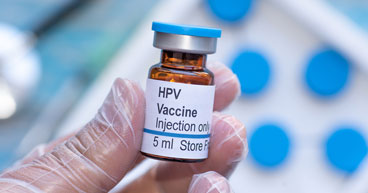
Since the first vaccine for smallpox was developed by English physician Edward Jenner in 1796, vaccines have prevented a variety of devastating maladies and saved millions of lives. The World Health Organization lists 25 available vaccines—for diseases from cholera to yellow fever. More than a dozen more vaccines are in development for illnesses like malaria and HIV.
Not on the list of current or potential vaccines is one that prevents all cancers. In fact, despite advances in medicine, and in cancer treatment in particular, one unfortunate scientific reality is that a universal vaccine to prevent cancer will likely never be developed.
"Biologically impossible," says Maurie Markman, MD, President of Medicine & Science at City of Hope® Cancer Centers Atlanta, Chicago and Phoenix. "There can't be a vaccine for cancer because cancer isn't a single entity. It's thousands of different conditions."
Still, vaccines play a vital role in the prevention of some cancers and in the treatment of others, and they are an essential tool in protecting cancer patients during treatments that may make them more vulnerable to illnesses.
In this article, we’ll explore:
- Vaccines for cancer prevention
- Vaccine therapy for cancer
- Cancer vaccine research
- Which vaccines should cancer patients get?
If you’ve been diagnosed with cancer and would like to get a second opinion on your diagnosis or treatment options, call us or chat online with a member of our team.
Vaccines for cancer prevention
We are under constant assault by armies of viruses. Our immune system fights off many of them in cellular battles we never know are being waged every day. Some viruses may cause colds, COVID-19 or the flu.
Scientists have identified these eight viruses known to increase the risk of cancer:
- Human papillomavirus (HPV)
- Epstein-Barr virus (EBV)
- Hepatitis B virus (HBV)
- Hepatitis C virus (HCV)
- Human immunodeficiency virus (HIV)
- Human herpes virus 8 (HHV-8)
- Human T-lymphotropic virus-1 (HTLV-1)
- Merkel cell polyomavirus (MCV)
Of these eight viruses, vaccines are effective against two.
The HPV vaccine
HPV, the most common of all sexually transmitted infections, is a family of hundreds of different viruses, most of which are harmless and easily vanquished by the immune system.
The HPV vaccine targets the aggressive strains of HPV that may lead to the cancers listed in this chart.
| Cancer type |
Annual diagnoses |
Percent likely caused by HPV |
Number likely caused by any HPV |
|---|---|---|---|
| Cervical | 11,869 | 91 | 10,800 |
| Vaginal | 875 | 75 | 700 |
| Vulva | 4,238 | 69 | 2,900 |
| Penile | 1,364 | 63 | 900 |
| Anal | 7,560 | 91 | 6,900 |
| Oropharyngeal | 20,805 | 70 | 14,800 |
Widespread inoculation with the HPV vaccine would dramatically reduce the number of new diagnoses of those cancers. But less than 40 percent of those who meet recommended age groups have received the vaccine.
The HBV vaccine
The hepatitis B vaccine is designed to help prevent some cases of liver cancer. The virus is the leading cause of liver cancer worldwide, accounting for about 56 percent of all cases. Only about 30 percent of Americans are fully vaccinated against HBV.
"These vaccines prevent viruses that cause inflammation that may lead to cancer," says Stephen Lynch, MD, Primary Care and Intake Physician and Vice Chief of Staff at City of Hope Phoenix. Other viruses, such as HIV, also may lead to cancer, but so far, no vaccines have been developed to prevent them.”
Vaccine therapy for cancer
Therapeutic or treatment vaccines for cancer are designed to stimulate the immune system to attack cancer cells.
The two therapeutic cancer vaccines are now in use are:
- Sipuleucel-T (Provenge®), which may help treat advanced prostate cancer
- Bacillus Calmette–Guérin (BCG) vaccine, which was originally developed for tuberculosis and has since been approved to treat bladder cancer
"These can be very useful," Dr. Markman says. "They are very potent immune stimulants."
Cancer vaccine research
While some vaccines are being used to help prevent and treat certain cancers, some scientists doubt whether those uses can be expanded in a meaningful way, especially since research into new cancer vaccines has not yielded the results many hoped.
"The history of cancer vaccines is a history of failure," writes one author who chronicled the decades-old frustration over cancer vaccine research.
Researchers continue to be stumped by a persistent question: What should the cancer vaccine target? Scores of cancers are caused by a multitude of gene mutations, so developing a vaccine to target all possible mutations is likely impossible. And since cancer cells are the body's own cells gone rogue, many cancer cells are able to hide in plain sight from the immune system. That’s why, even when the immune system is stimulated by certain drugs, it doesn't always know what targets to attack.
"First of all, you have to identify something that's targetable for your immune system," Dr. Lynch says. "The intent of the vaccine is to generate an immune response, to have soldiers on watch to attack when presented by an antigen, bacteria or a virus. So, you have to identify a pathogen that you can target with a vaccine. That's the great mystery."
For decades, researchers have eyed messenger ribonucleic acid (mRNA) as a potential for vaccines and the treatment of many viruses, including Zika and influenza, and for several diseases like cancer.
Until now, practical applications of mRNA technology have been elusive. Doctors, researchers and scientists are hopeful that the mRNA-based vaccines that have proven safe and effective against COVID are harbingers for new mRNA-based vaccines and treatments for cancer and other conditions.
“The developments related to the success employing mRNA in the production of a COVID-19 vaccine provides realistic hope for the potential for this strategy to be used with other types of vaccinations, including in cancer prevention, and possibly even treatment of active cancer,” Dr. Markman says. “Of course, we must wait to see the results of ongoing and future laboratory and clinical research to know if this promise ultimately becomes reality.”
Still, an mRNA vaccine would not likely be for all cancers, but rather developed for an individual cancer.
For instance, scientists at the University of Florida are testing an mRNA vaccine for glioblastoma, a deadly brain cancer. Another group of researchers is working on a personalized mRNA vaccine for pancreatic cancer.
Both glioblastomas and pancreatic cancers have an average five-year life expectancy of about 15 months after diagnosis.
“If we can understand the how to harness the RNA process, it's possible that we can stop the flow of the cancer that way,” says Ajaz Khan, MD, Chair, Department of Medical Oncology at City of Hope Atlanta, Chicago and Phoenix. “The challenge always is these cancers mutate and they don't always share the same segment of RNA. Once they start to mutate the vaccine may work for a while and then stop working.”
Which vaccines should cancer patients get?
Separate from vaccines designed to treat and prevent cancer are those that are being used as a critical tool in helping cancer patients stay healthy during and after treatment.
Some cancer treatments, such as chemotherapy and stem cell or bone marrow transplants, may severely compromise the patient's immune system. That’s why it’s so important that cancer patients, and their caregivers and family members, receive vaccines for the flu and other preventable illnesses.
“When the flu vaccine becomes available, you should get it,” Suji Mathew, MD, Infectious Disease Physician and Chief of Medicine at City of Hope Atlanta “It’s a good preventive tool to use. It’s an important first step for caregivers and family members of cancer patients to take to prevent getting an infection.
“The flu can cause pneumonia, respiratory failure, encephalitis (inflammation of the brain) and other serious complications, including death,” she says. “It’s not a disease that should be taken lightly.”
Cancer patients may also need to avoid live vaccines, or those that use live viruses to inoculate against disease. Live viruses may replicate in cancer patients with compromised immune systems, causing infections instead of preventing infections.
Patients should also avoid contact with people who have received live vaccines for the same reason. Also, patients who have had stem cell or bone marrow transplants may need boosters or new vaccinations at some point after treatment, because such transplants often reverse the immunization effect of previous vaccines.
One of the biggest challenges in keeping patients healthy during treatment, though, is convincing them to actually get vaccinated, doctors say. Conspiracy theories linking vaccines to autism or other conditions have prompted some parents to refuse vaccinations for their children. But the risks of avoiding vaccinations are high.
In 2017, a measles outbreak in Minnesota sickened 79 people, many of them unvaccinated children. And more than 125 people infected in California were linked to trips to Disneyland. A survey by the Centers for Disease Control and Prevention showed that 28 of those patients were intentionally unvaccinated because of personal beliefs.
"It's a serious problem," Dr. Markman says, "when we have vaccines that have been shown to reduce cancer rates, and people will not use them."
If you’ve been diagnosed with cancer and would like to get a second opinion on your diagnosis or treatment options, call us or chat online with a member of our team.



